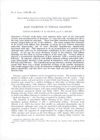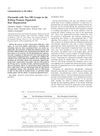 102 citations,
February 2008 in “The FASEB Journal”
102 citations,
February 2008 in “The FASEB Journal” One minoxidil-sensitive potassium channel exists in human hair follicles.
 92 citations,
October 2002 in “Journal of The American Academy of Dermatology”
92 citations,
October 2002 in “Journal of The American Academy of Dermatology” Finasteride improves hair loss in women with hyperandrogenism.
 80 citations,
December 2017 in “International Journal of Dermatology”
80 citations,
December 2017 in “International Journal of Dermatology” Low-dose oral minoxidil and spironolactone combo effectively reduces hair loss and improves hair density in women.
 63 citations,
October 1972 in “British Journal of Dermatology”
63 citations,
October 1972 in “British Journal of Dermatology” Women with thinning hair have thinner hair strands than women without hair loss.
 54 citations,
February 2010 in “British Journal of Dermatology”
54 citations,
February 2010 in “British Journal of Dermatology” Hair loss in women may have causes other than hormones.
 53 citations,
May 1986 in “Clinics in endocrinology and metabolism”
53 citations,
May 1986 in “Clinics in endocrinology and metabolism” Androgens like testosterone affect hair growth and oil production differently across body parts and individuals.
 40 citations,
December 2011 in “British Journal of Dermatology”
40 citations,
December 2011 in “British Journal of Dermatology” Women's hair generally gets thinner and less dense starting in their mid-thirties, with hair loss becoming more common as they age due to both genetics and environment.
 39 citations,
January 2008 in “Journal of Endocrinology”
39 citations,
January 2008 in “Journal of Endocrinology” SCF and c-Kit decrease in AGA hair follicles, possibly affecting hair pigmentation and growth.
 38 citations,
October 1988 in “Clinics in Dermatology”
38 citations,
October 1988 in “Clinics in Dermatology” Hormones, nutrition, and seasonal changes regulate hair growth cycles, with androgens extending growth phases and factors like aging and malnutrition affecting hair loss and thinning.
 35 citations,
March 2007 in “Skin Research and Technology”
35 citations,
March 2007 in “Skin Research and Technology” The conclusion is that exogen is a unique hair cycle phase and the new sampling method specifically targets this stage, which may help in future hair loss research.
 33 citations,
January 1997 in “Endocrinology”
33 citations,
January 1997 in “Endocrinology” Testosterone can slow down hair growth when combined with certain cells from bald scalps, and this effect can be blocked by an androgen receptor blocker.
 31 citations,
May 2012 in “European Journal of Dermatology”
31 citations,
May 2012 in “European Journal of Dermatology” Menopause affects hair and skin; more research needed for treatment.
 30 citations,
May 2010 in “British Journal of Dermatology”
30 citations,
May 2010 in “British Journal of Dermatology” Intermediate hair follicles are a better model for studying hair growth and testing hair loss treatments.
 26 citations,
April 1999 in “Dermatologic Clinics”
26 citations,
April 1999 in “Dermatologic Clinics” The long-pulsed alexandrite laser is effective for hair reduction, particularly for light-skinned individuals with dark hair, but caution is needed for darker skin.
 23 citations,
March 2001 in “Clinics in Dermatology”
23 citations,
March 2001 in “Clinics in Dermatology” Hair restoration surgery techniques have evolved, with focus on patient selection and realistic goals, and future advancements may include cloning and gene therapy.
 20 citations,
October 2013 in “British Journal of Dermatology”
20 citations,
October 2013 in “British Journal of Dermatology” The document concludes that clinicians should be aware of common hair and scalp disorders in women of African descent and that more research is needed to develop effective treatments.
 13 citations,
August 2019 in “Biological & Pharmaceutical Bulletin”
13 citations,
August 2019 in “Biological & Pharmaceutical Bulletin” Certain flavonoids help grow back colored hair after skin injury.
 12 citations,
May 2011 in “Dermatologic Clinics”
12 citations,
May 2011 in “Dermatologic Clinics” Hair loss in autoimmune blistering skin diseases varies and may regrow with disease control.
 12 citations,
January 2007 in “Current problems in dermatology”
12 citations,
January 2007 in “Current problems in dermatology” Environmental and cosmetic factors, including heat, chemicals, and sun exposure, can cause hair loss and damage.
 11 citations,
October 2016 in “Biomedicine & Pharmacotherapy”
11 citations,
October 2016 in “Biomedicine & Pharmacotherapy” Both human platelet lysate and minoxidil can promote hair growth, but they affect different genes and cell survival rates.
 4 citations,
January 2017 in “Biological & pharmaceutical bulletin”
4 citations,
January 2017 in “Biological & pharmaceutical bulletin” Inhibiting ALOX12 can help hair cuticle maturation by increasing S100A3 citrullination.
 2 citations,
April 2018 in “Journal of Cosmetic Dermatology”
2 citations,
April 2018 in “Journal of Cosmetic Dermatology” Tumescent fluid increases scalp hair angles, which may improve hair transplant results and reduce surgeon fatigue.
 1 citations,
July 2023 in “Advances in therapy”
1 citations,
July 2023 in “Advances in therapy” Hair transplantation is safe and effective for children with scar-related hair loss.
 1 citations,
October 2013 in “BMJ”
1 citations,
October 2013 in “BMJ” A man's sudden hair loss and color change to white was diagnosed as alopecia areata and it improved on its own after six months.
 1 citations,
March 1992 in “Postgraduate Medicine”
1 citations,
March 1992 in “Postgraduate Medicine” About 40% of women by age 60 experience significant hair loss, often due to androgenetic alopecia, with treatments like minoxidil available and hope for future cures.
 1 citations,
May 1965 in “Medical Clinics of North America”
1 citations,
May 1965 in “Medical Clinics of North America” Hair growth dysfunction involves various conditions with limited treatment options.
 September 2022 in “KnE medicine”
September 2022 in “KnE medicine” Higher candle nut oil concentration increases droplet size and changes the hair tonic's properties and stability.
 January 2018 in “Springer eBooks”
January 2018 in “Springer eBooks” Gender affects hair and scalp characteristics, with differences in hormone responses, graying patterns, and trace metals.

North American ginseng extract helped regrow hair in balding mice.
 January 2013 in “Springer eBooks”
January 2013 in “Springer eBooks” Hair care products are important for appearance and self-esteem, and choosing the right ones can help maintain healthy hair.






























